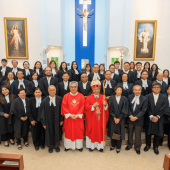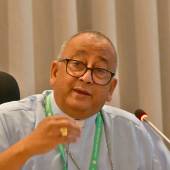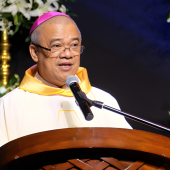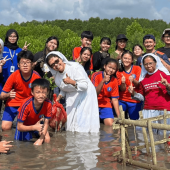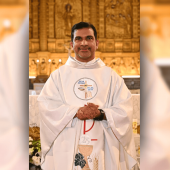Find the Holy Spirit through listening, says Archbishop of Japan
In an exclusive interview with Radio Veritas Asia, the Archbishop of Tokyo, Japan, Tarcisio Isao Kikuchi, shared how the Catholic Church should be the “church of listening.”
In the second part of the interview, Archbishop Kikuchi revealed how some clergy members just want to talk and teach.
“So, because we always try to want to talk, we always want to try to teach, but the talking and teaching, we can't find the Holy Spirit,” he said.
Speaking from experience, Archbishop Kikuchi also recalled that they sometimes forget to listen.
“So, the one with the most important thing right now is listening to what other people say, other people's stories, and other people's sharing. We don't have time to sit down and listen to the story of others. Unless we listen to other people's sharing, we will never find the Holy Spirit,” he said.
The archbishop reiterates that “we have to be the Church of listening.”
The president of Caritas Internationalis recalled that they were surprised when Pope Francis chose synodal as the theme for the synodality.
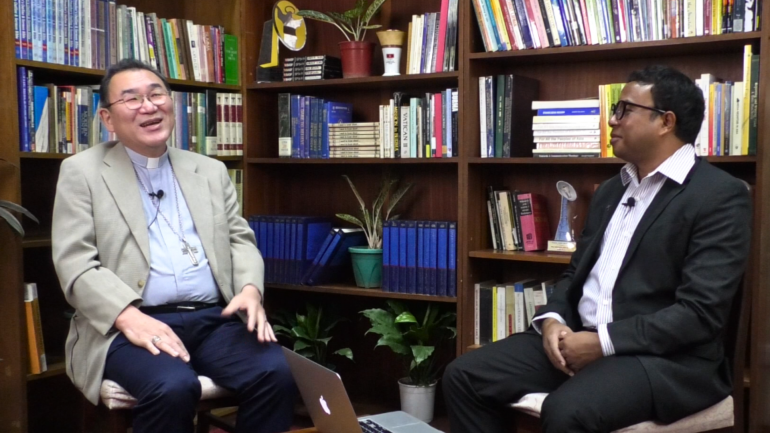
However, he stated that this should not come as a surprise because the Synodal process has existed since the Second Vatican Council was established.
“Synodality is not a new concept in the Catholic Church. It was already in the Second Vatican Council, and it has to be put into practice,” Archbishop Kikuchi explains.
In 1963, Vatican II promoted interfaith dialogue and a more collaborative relationship between lay people, bishops, and clergy.
“Everybody has to be involved in the discernment of the guidance of the Holy Spirit. It's not decision-making. It's a discernment discerning the guidance of the Holy Spirit so that everybody has to be involved,” he adds.
Archbishop Kikuchi concluded the interview by giving words of encouragement to the viewers of RVA.
He said the faithful of Asia should continue to spread the message of the Gospel despite difficulties because there are still so many people who are willing to listen to the Word of God.
He also urged us to be witnesses of the Gospel “through our daily activities, through our daily words, through our conversations with other people, and through our interaction with other people.”
The second segment of the interview, in which he discusses how the Holy Spirit should continue to inspire the church so that we become the "church of listening," his thoughts on synodality, and his message to the "people of Asia" not to be discouraged but to continue to spread the Word of God despite the minority status of Christians in Asia, is available on YouTube: https://www.youtube.com/watch?v=hT82fLdtfJk&t=6s
Read the full transcript of the interview below.
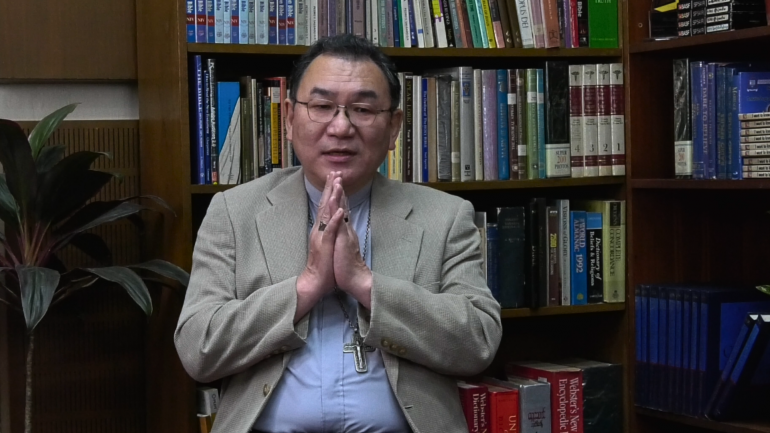
VOICE OF ASIAN BISHOPS
RVA Interview with Archbishop Tarcisio Isao Kikuchi of Toky by Fr. Kasmir Nema, SVD, from Radio Veritas Asia.
Fr. Kasmir Nema: Thank you for that great message, Archbishop. Let's go back to your country, Japan, and your position as archbishop of Tokyo. Looking at the reality of Japanese in general. So many. For instance, we talk about committing suicide. What message would you like to give to Japanese people and Catholics to strengthen, strengthen and grow their faith in God?
Archbishop Kikuchi:
Well, Japan went through a difficult time before the Second World War. The government was very close with the Shinto. They created national Shintoism. It's a national religion. So, the government was that is a religion for the emperor. And that time the government was very close to religion. So, because of that, it was very difficult to criticize the direction of policy of the government because it is a God-given policy. So that was one of the reasons why the Japanese made a big mistake before and during the Second World War. And we lost.
So, after we lost and Japan lost the war, then the politicians are very careful about having any connection with the religion. So, they wanted to eliminate any kind of region from the public arena. So, politicians should not have any connection with religion and education should not have any connection with religion, any kind of religion. So, if you go to a public school in Japan, there is nothing about religion there. They never teach anything about religion. Well, religion may be taught in history, but not as an actual subject. So, people are detached from the religious city, even though the cultural background is Shintoism and Buddhism.
So everybody goes like at the beginning of the year, they go to the temple or shrine for the nation or they go for the kind of the passage of the life. Like when you become a certain age, you go to for the blessing the Shinto shrine. Well, they come to the Christian church for the wedding all they go to the temple for the funeral. This kind of religion is not that it's a part of their life, but it is it has no connection with their mind and their heart. So the religion, the people have lost the sense of such kind of religiosity.
So that's why it's very difficult. They want to come to the Catholic Church for the wedding. It looks very nice to have the wedding in the Catholic Church, but it doesn't connect them to the faith. So that is the biggest challenge for us right now. it's not only the suspicion, but they are not interested in the people are not interested in to make any decision to join the special religious groups. So that is affecting us
Fr. Kasmir Nema: Having that missionary thing we like to mention in Japan and here we have FABC know triple dialogue, dialogue with cultures, religion, and the poor people, whatever it applies to you in Japan. How do you implement this triple dialogue in your ministry as Archbishop?
Archbishop Kikuchi:
Especially the dialogue with religion. I think we have done a lot in that area, especially with the Buddhist and also the new religion of Buddhism and Shintoism. We have this special connection with the World Council for Peace via the Council of Peaceful Religion. the Region for the Peace. The Catholic Church has been involved with the ritual course, okay, which is the new Buddhist religion of the Buddhist. And then, well, maybe I should say that they are much more into the dialogue with the Christians than we are into the dialogue with the Buddhists or the centrist. So they are much more serious about it.
So we are very much involved in the ecumenical also and also the dialogue with the other vision. But then for the other dimension like culture. Well, if you come to the church in Japan and Catholic Church in Japan and attend the Sunday masses and then you don't see any cultural element as such, that is lacking in the Japanese Catholic Church. And then the poor dialogue with the people, the reality of the people that is we are into it for many years through the social activities. We have so many social welfare institutions and also the parishes have groups to support the poor people or the homeless and all things.
So, we are really into it. But then the problem is now that Japanese society is now aging. We don't have we have many elderly people, and we have a very small number of children, young people. So, if you come to the Catholic Church, not only the Catholics, any groups in Japan social groups, you see only the old people, not the young people. That is a big problem right now means—the Catholic Church. We don't have the people to walk. We have the people to have cared, the old people. But we don't have the young people to work for such kinds of social activities that is one of the problems right now.
Fr. Kasmir Nema: Speaking about reality, the Japanese bishops’ leaders have been thinking about or planning how to resolve this issue of being faithful in your home.
Archbishop Kikuchi:
We have them. We have several committees and bishops’ committees dealing with different types of social activities like those like Caritas. Yes. And also there is the Migrant and Refugees Commission and also there's Human Rights Commission. This kind of commission is really, really into these. The particular problems or particular are the challenges. Actually, at the end through these, I think we are having the connection with many people, non-Catholics, and non-Christians, to try to show through our activities that this is what we believe in.
So we can try to be the witness of the gospels through these activities of the social, social actions. So, we have put quite a lot of emphasis on these social activities of the bishop’s committees, and there will continue that. But more recently, we are facing criticism from the general public because several incidents are happening in the Japan Japanese society the region, religious groups, the Certain religious groups have a special connection with the politicians. And then there is so much criticism from the general public that the religion, religious groups should not have any connection with the politicians.
So then whenever the Catholic bishops spoke about anything against the government, there will be the same criticism that all religious people shouldn't speak about politics and that that is the big problem right now.
Fr. Kasmir Nema: Francis proposed for the church synod not to renew its missionary approach or any other activities related to the mission. Now, if I asked you, Archbishop, what is the synodal church, do you know?
Archbishop Kikuchi:
When we heard about the theme of the synod this year, we were really surprised because we had so many synods for so many years since the Second Vatican Council, and now we are talking about what is. So, we are really surprised that the Holy Father chose Sodality as a theme of the Synod. But at the same time, when we look back, the Second Vatican Council, of course, the Vatican Council was talking about what is Synodality. The church is a people of God. And that idea is written in the book. But actually, it was not put into practice even after the Second Vatican Council. The charges didn't change. There is a bishop of the pope, a Bishop, and then a priest and people.
Oh, this kind of pyramid was still the hierarchy was still there. And the decision has to be made by the pope, bishops, and priests, and late issue to follow obey the decision of the top in the hierarchy. That was the structure of the church. But that was not the idea of the Second Vatican Council. The people of God are not that hierarchical structure. So, the idea was already there in the 1960s in the written book, and it was talking about that but what was not executed.
So, after so many years, finally Holy Father made the decision that we have to go back to that original idea of the Second Vatican Council. So, it is not new I was surprised, as many people are surprised that synodality would be the theme of the synod, but that synodality is not a new concept in the Catholic Church. It was already there in the Second Vatican Council. And so it has to be put into practice. Now, some people are saying that it is because the number of priests, and number of the vocations are reducing.
We don't have many priests anymore. So that's why the laity has to take over the decision-making position in the Catholic Church. It is not true. It is just a coincidence. But the original idea is coming from the Second Vatican Council. Everybody has to be involved in the discernment of the guidance of the Holy Spirit. It's not decision-making. It's a discernment discerning the guidance of the Holy Spirit so that everybody has to be involved. So I think it's very important.
Fr. Kasmir Nema: So if I ask you, what are the practical suggestions you would like to make for the leaders of the church to be more, you know, synodal mindset in their missions?
Archbishop Kikuchi:
Last year, in October, we had the FABC 50 General Assembly in Bangkok, and many bishops from all over Asia came. I was also there and during the three weeks of the General Assembly or two or three days, we had the Indian consultant king and then he told us about how to do the sharing and it was a workshop. So all the bishops are divided into groups of four and we once are forced to give to share the difficulties in the ministry. And the other three have to listen to it and after listening to it or just pray, give us some silent moments and then also share their thoughts.
Well, I was in the one with the group. And immediately the one bishop started to tell the story of the difficulties. Immediately other bishops started to teach you what to do. They didn't listen when the bishops started to say something. Then the other bishops said, No, no, no. Why don't you do this? Why don't you do this one? Why did you do this? So they wanted to teach. And then when they experienced that, Oh, that is the saga of the bishops. We want to teach. We don't want to listen to it. So the one with the most important thing right now is listening to other people's say, other people's stories, and other people's sharing. we don't have time to sit down and listen to the story of others. unless we listen to other people's sharing will never find the Holy Spirit. So because we always try to want to talk, we always want to try to teach, but the talking and teaching, we can't find the Holy Spirit. So we have to be the church of listening.
Fr. Kasmir Nema: That's great. Our final question, talking about what that church of listening out there are millions of are we are viewers, you know listen to all of your conversations in your story your message to our viewers an RVA around Asia and beyond. What message do you want to convey to them?
Archbishop Kikuchi:
All over Asia, we are minorities. Christians are always minorities. Except in the Philippines, maybe, but in most places in Asia, we are minorities, and other times we face difficulties proclaiming the good news of Jesus Christ. And sometimes we are persecuted, and even just to get together for prayer, some people will be arrested, but we shouldn't be discouraged by our daily activities, our daily words, our conversations with other people, and our interactions with other people. We can be witnesses to the gospel of Jesus Christ. And that is how we disseminate the good news to all the people in Asia. There are so many people waiting to listen to the Word of God, so we shouldn't be discouraged, but we should try to listen to others. And through our actions, and our words, we can be witnesses to Jesus Christ.
Fr. Kasmir Nema: That's very great. Bishop, thank you very much. We have to end our conversation here. I am Fr. Kasmir Nema, SVD. Thank you for watching and seeing us. Next time for more interesting conversations with other Asian bishops.
END.
Radio Veritas Asia (RVA), a media platform of the Catholic Church, aims to share Christ. RVA started in 1969 as a continental Catholic radio station to serve Asian countries in their respective local language, thus earning the tag “the Voice of Asian Christianity.” Responding to the emerging context, RVA embraced media platforms to connect with the global Asian audience via its 21 language websites and various social media platforms.









